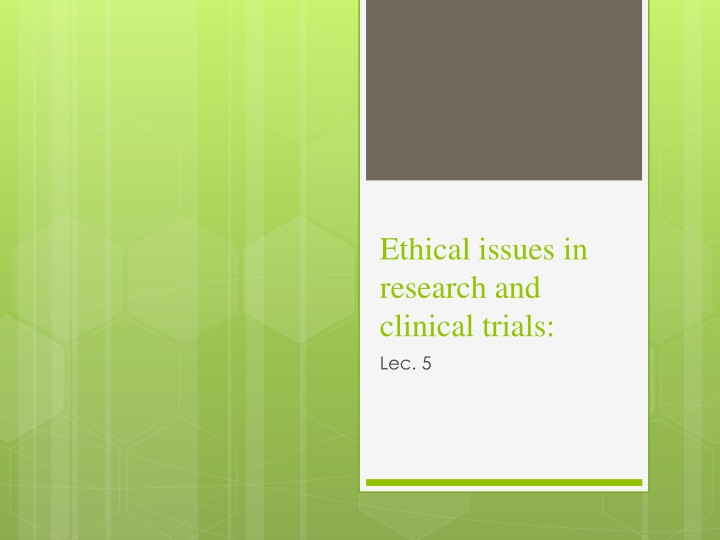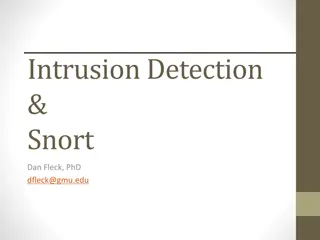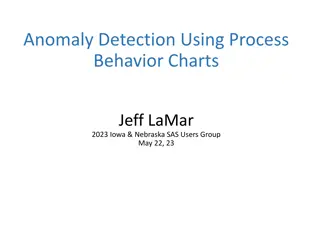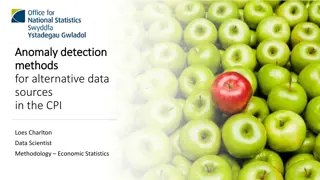Anomaly Detection in Data Mining: Understanding Outliers
Anomaly detection, a key aspect of data mining, involves identifying data points that deviate significantly from the norm. This process is crucial in various fields, from fraud detection to fault diagnosis. Challenges in anomaly detection include determining the number of outliers and validating unsupervised methods. The importance of recognizing anomalies is demonstrated by historical incidents like the ozone depletion discovery. Learn more about anomaly detection techniques and their applications in this insightful lecture material.
Download Presentation

Please find below an Image/Link to download the presentation.
The content on the website is provided AS IS for your information and personal use only. It may not be sold, licensed, or shared on other websites without obtaining consent from the author.If you encounter any issues during the download, it is possible that the publisher has removed the file from their server.
You are allowed to download the files provided on this website for personal or commercial use, subject to the condition that they are used lawfully. All files are the property of their respective owners.
The content on the website is provided AS IS for your information and personal use only. It may not be sold, licensed, or shared on other websites without obtaining consent from the author.
E N D
Presentation Transcript
Ethical issues in research and clinical trials: Lec. 5
Good Research Practice (GRP): should ensure that research is well-planned, ethically approved. The requirement of ethics committee approval is a stringent requirement for medical related research where there may be the use of animal or human subjects. Approval is needed from institutional review board (IRB) or institutional ethics committee (IEC) on research involving human or human issues. designed and
In the US, an IRB is a board, a committee or a group of people designated by an institution like hospitals, academic medical center, government units and others to review research involving human as subjects.
Modern drug development follows the following key stages: 1- Program selection (choosing the disease target) 2- Identification and validation of the drug target 3-Assay development 4- Identification of a lead compound 5- Optimization of the lead compound 6- Identification of a drug candidate. 7- pre- clinical study ( a broad study encompassing animal studies, toxicity studies and pre-formulation studies.
8- Clinical trials on human subjects, registration 9- Release of the drug to the market. 10- Follow- up monitoring (adverse drug reaction reporting) Usually those diseases suffered by people in developed nations will be more attractive for the pharmaceutical companies, for example, not much research is being carried out by pharmaceutical companies on drugs for AIDS as the vast majority ofAIDS sufferers are from the
Third world such as those from the African continent. Ethically this is not right but the pharmaceutical companies need to pay back the money which has been spent on research.
Pre-clinical research: It involves studies of a drug before it is approved for studies on humans. These studies are designed to collect data at the earliest stage to confirm activity. Among the studies can be the spectroscopic studies to identify the chemical structure and animal studies using wide- ranging doses of the study compound to obtain preliminary effectiveness and toxicity along with determination of the pharmacokinetic of the new compound in animal models and to predict the pharmacokinetic in human.
Preclinical companies to decide whether a drug candidate has scientific merit for further development. Preclinical studies must adhere to Good Laboratory Practice (GLP). The use of animals needs clearance from the animal ethics committee. Animals are used to study the toxicity including studies on organs that are targeted by the new compound, as well as studies on long-term carcinogenic effects or any adverse effects on the reproductive system. studies will assist pharmaceutical
Information collected from preclinical studies is important so as to ensure the follow-up clinical trials on human is safe and there are no unexpected adverse effects. Although animal studies have been reduced in recent years both for ethical and cost reasons, most research will still involve animal-based testing for the need of similarity in anatomy and physiology that is required for diverse product development. Another important component where pharmacists play a very important role is the pre-formulation studies.
Pre-formulation Is a branch of pharmaceutical sciences that utilizes biopharmaceutical principles in the determination of the physiochemical properties of the drug. These parameters are; constant (pka), dissolution behavior, stability, solid state properties such as crystal forms/polymorphs, water sorption behavior, particle size and shape and others. solubility, ionization surface properties,
Pre-formulation studies are needed to determine the end dosage form of the drug also to decide whether the dosage form will be an oral solid dosage form or an intravenous or other rout of administration.
Ethical marketing of pharmaceutical products: Pharmaceutical organization are made up of pharmacists who are professional bodies. So each pharmacist has a duty to uphold an ethical relationship within the business. They are required by their code of conduct to care for the health and safety of human beings. Because of the several nations not only regulate pharmacists but also pharmaceutical companies. governed by their
Many unethical practices are entirely lawful. For example mercurial soap used for skin whitening is unlawful to be marketed in all developed nations but some of these nations allow the manufacture of such products for export markets. Pharmaceutical companies use the service of sales representatives in marketing their products. These sales representatives need to be adequately trained and possess sufficient medical and technical knowledge to present information about the products in an accurate and responsible manner.
The sales representatives should not only be able to provide accurate information, but should also not to exaggerate the capabilities of the product. He or she should be able to talk about the property of the product or the mode of action of the drug and possible side effects. The practice of giving others gifts by pharmaceutical companies is unethical. A good example is giving free overseas trips under the pretense of sponsorship for attending conferences or workshops. In this case
The pharmaceutical companies and the physician can both be guilty of misconduct in under their own code of conduct. Pharmaceutical organizations must not only see how much profit can be made but also how ethical is the profit that is made. Among the recommendations is that all marketing activities under the code must conform to existing and relevant government legislation governing the practice of the pharmaceutical industry.
Pharmacist role in complementary and alternative medicine: Are health practices that have the component of pharmaceutical preparations, dietary supplements and traditional forms of health practice such as acupuncture, Chinese medicine, homeopathy, etc. Lacking the efficacy component, their registration requirement is of a lesser standard than convential medicines.
There complementary and alternative medicine found such as the use of cranberry for urinary tract infections. other claims are not evidence based. As pharmacists sell these items in their pharmacies it will give credibility to these products. Pharmacists can play the role in counselling for the use of these products to ensure the health and safety of patients is not jeopardized. is only evidence for efficacy of
Code of ethics for pharmacists: 1- Make the health and well-being of the patient your first priority. 2- Promote patient self determination, respect patients rights, autonomy and freedom of choice 3- Use your professional judgment in the interests of patients and the public and promote family and community health.
4- Show respect for others and exercise your duties with professionalism 5- Activity seek and apply knowledge and skills to ensure a high standard of professional competence. 6- Act in a manner that promotes public trust and confidence in pharmacists and enhances the reputation of the profession 7- Practice in a manner that does not compromise your professional independence, judgment or integrity or that of other pharmacists contemporary pharmacy
Pharmacy License Pharmacy Licenses for pharmacists are obtained from the state board of pharmacy. Each state has a specific requirement for the operation of pharmacy, with requirements for equipment, counseling. establishment must be licensed. staffing and
Pharmacy Applicant requirements: These requirements include: 1- Graduation from pharmacy school 2- Internship 3-Age of 21 4- Passing the licensure exam with 75% or better 5- Good moral character.























